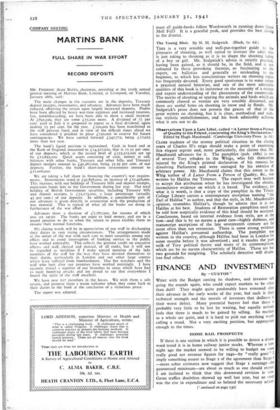Observations Upon a Late Libel, called "A Letter from a
Person of Quality to his Friend, concerning the King's Declaration." Edited by Hugh Macdonald. (Cambridge University Press. 3s. 6d.) CLOSE students of the stormy political situation in the closing years of Charles II's reign should make a point of examining this elegant reprint and, more particularly, the claims that Mr. Macdonald advances for it. The pamphlet (pub. 1681) is one of several Tory rebukes to the Whigs, who felt themselves injured by the King's printed declaration of his reasons for dissolving Parliament and were outraged by his exercise of arbitrary power. Mr. Macdonald claims that this retort to the Whig kuthor of A Letter From a Person of Quality, &c., was written by Halifax the Trimmer. The expert may well hesitate to accept this attribution when he has investigated the slender, inconclusive evidence on which it is based. The evidence, for what it is worth, is that a copy of the pamphlet in the Trinity College Library carries a contemporary ascription naming "the Earl of Halifax" as author, and that the style, in Mr. Macdonald's opinion, resembles Halifax's, though he admits that it is not Halifax at his best. Students of Restoration pamphlets need not be told how sceptically evidence of this kind should be accepted. Conclusions, based on internal evidence from style, are at the best—and this is by no means a good case—highly dubious, and manuscript ascriptions of the late seventeenth century are far more often than not erroneous. There is some strong evidence against Halifax's presumed authorship. The pamphlet viu written in the country, although Halifax had been in London for some months before it was advertised ; and it exudes the pure milk of Tory political theory and many of its commonplaces, which are by no means characteristic of Halifax. These are but two grounds for misgiving. The scholarly detective will doubt- less find others.






























 Previous page
Previous page